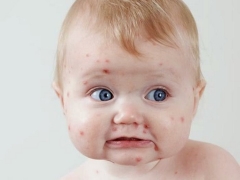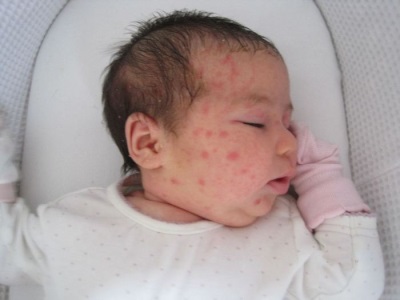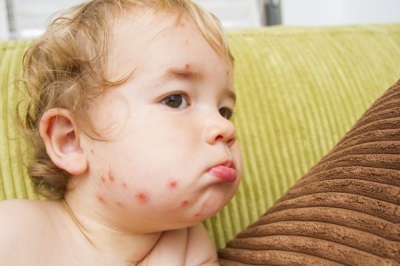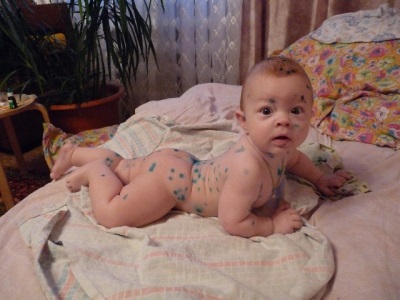Chicken pox in babies
Practically every person faces this kind of childhood infection like chicken pox. Often, this disease is diagnosed at the age of two years, but sometimes chickenpox can also occur in infants.
Is this infectious disease dangerous for children younger than a year, are newborn children sick with chickenpox and what should parents do if the chicken pox started at a very early age?
Can babies get chickenpox
If the mother has had chickenpox before pregnancy, the first 6 months the baby is protected from the pathogen of this infection thanks to the antibodies received from the mother during gestation and during breastfeeding.
Infection of an infant baby with the Varicella Zoster virus, which causes chickenpox in a person, is possible in the following ways:
- In utero from a mother who did not have chickenpox before pregnancy and contracted the virus during the gestation period. It is especially dangerous if infection occurs in the first 12 weeks of pregnancy, as the Varicella Zoster virus in this case provokes the development of serious pathologies in the fetus. When the pathogen gets to the baby in the last days of pregnancy (5 days before birth), it causes congenital chickenpox. If the infection occurs later than 12 weeks, and the woman’s illness begins earlier than a week before the birth, the crumb has enough time to get enough antibodies from the sick mother, so the chickenpox may not appear.
- Airborne droplets from a child or adult who has chickenpox. Typically, such an infection occurs at the age of more than 6 months, when the protection of maternal antibodies disappears, and the crumb becomes susceptible to the Varicella Zoster virus. If he is in the same room with a sick chickenpox, for example, if the infection is detected in an older brother or sister visiting kindergarten, then the risk of infection is very high.

It is known that incubation period with chickenpox averages 10-21 days. In this case, most often in babies from 6 months to a year, this period, during which the virus develops in the body of the baby and does not manifest itself, shortens to 7 days.
Symptoms
The first symptoms of chickenpox in infants are anorexia and sleep, restless behavior, weakness. Soon, the baby's body temperature rises (sometimes only to 37-38 degrees, but many toxins also have a higher temperature) and a rash occurs. Rashes appear first on the body, then on the head and on the limbs.
The elements of the rash gradually change shape - first they look, as spots, then become similar to mosquito bites (papules) and very quickly transform into bubbles filled with clear liquid. Soon such bubbles dry up, and crusts appear on their surface.
While some bubbles have dried up, new spots appear on clean skin, which also turn into vesicles. If you do not comb this rash, within a few weeks the crusts disappear without leaving any marks.
How is chicken pox tolerated in infants
The course of chickenpox at the age of up to one year is both easy and difficult.If the baby takes the infection easily, his general condition changes slightly, and the rash is represented only by single elements. However, due to the immature immunity in babies up to one year, severe forms of chickenpox are not uncommon.
In newborns infected by their mother immediately before the birth, the disease is also very difficult. In this case, the crumbs have a very high temperature, a lot of bubbles and possible complications (encephalitis, pneumonia, hepatitis, and others).
How to treat chickenpox at the age of one
- If the disease is mild, her are being treated in infancy only symptomatically and in home conditions. Severe course requires hospitalization and prescription of antiviral drugs.
- To lower the temperature, babies are given paracetamol or ibuprofen, specifying the dosage at the pediatrician.
- For processing bubbles you can use brilliant green, calamine lotion or suspension Tsindol based on zinc oxide. In case of severe itching, Fenistil gel can be applied to the baby over the month of age.
- If bubbles appeared in infants in the mouth, on the genitals or on other mucous membranes, they can be washed with herbal extract (for example, chamomile) or furatsillina solution. The wounds formed on the mucous membranes can be treated with sea buckthorn oil, and if they greatly disturb the baby, then smear it with one of the anesthetic gels used during teething.
- It is important to prevent the vesicle from scratching, therefore, the baby with chickenpox wear gloves, and if the itching is very pronounced, go to the doctor for the selection of an antihistamine.
- Bathe baby with chickenpox is not prohibited, as hygiene procedures help reduce itching. In this case, the bath is not recommended during the period of high temperature. If the well-being of a karapuz has returned to normal, you should not avoid bathing. However, when water procedures, you should follow some recommendations - do not overheat the water, do not use detergents and washcloth, do not rub after bathing with a towel.
- If the course of chickenpox in infants is severe, the doctor prescribes antiviral facilities, eg, Acyclovir - a drug that affects the virus Varicella Zoster, blocking its reproduction in the children's body. In very severe cases, this medicine is injected into the baby intravenously, as well as applied to the vesicles in the form of an ointment.
- In the case when mom got sick with chicken pox five days before delivery or later, Immediately after birth, an immunoglobulin is administered to the newborn to help destroy the Varicella Zoster virus. Also such babies must be administered Acyclovir.

Prevention
If the expectant mother has never had chickenpox and is thinking about how to protect against chickenpox and herself in the gestation period, and the baby in the tummy, the best option would be vaccination. To make chickenpox vaccine recommend at least 3 months before the planned pregnancy. And since the vaccine against chickenpox in adulthood is administered twice with an interval of 6-10 weeks, apply for vaccinations in the clinic should be even earlier.
Children older than six months can be protected from infection from the older child in the family by isolating the sick baby during the period of greatest infectiousness and frequent wet cleaning in the apartment (the virus is very unstable outside the human body).
But, since a child with chickenpox becomes contagiouswhen there are no clinical manifestations of the disease (on the last day of the incubation period), it will not be possible to fully protect infants from chicken pox in a situation when the eldest child “brought” it from the garden or school.













